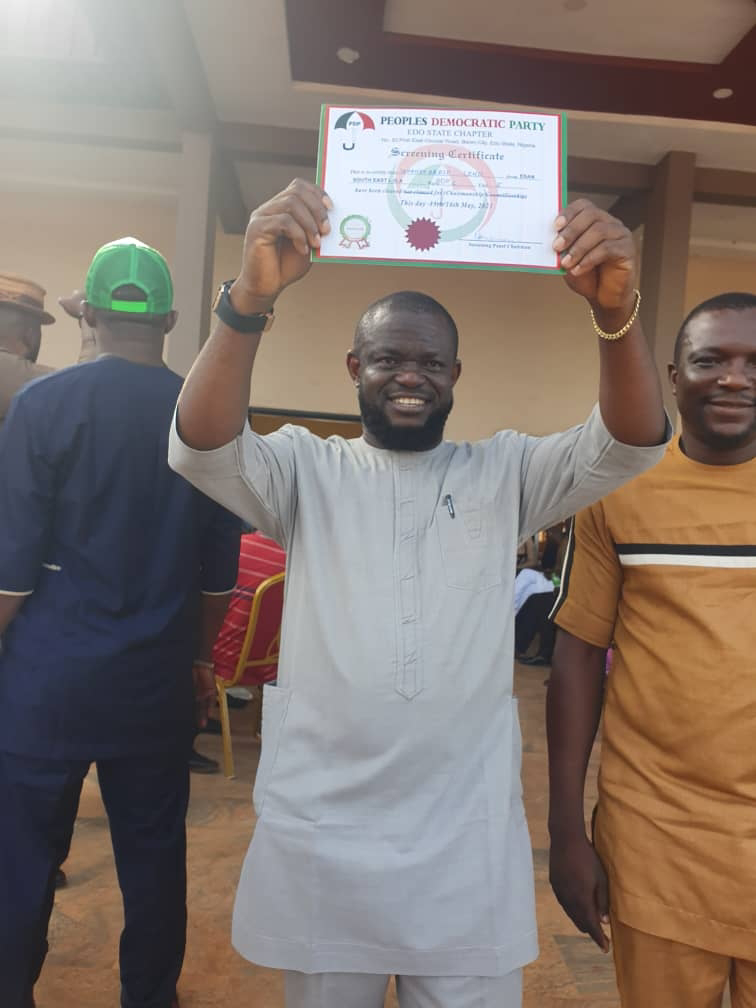Toxic Environment Fueling Migration in Nigeria - Clergy
By Lucky Isibor
The toxic nature of the Nigerian environment exemplified by corruption, lack of good governance, insecurity, low employment opportunities and failed social infrastructure are the factors responsible for migration out of Nigeria by the youths know in local parlance as "JAPA".
Participants at the lecture
The Director of Liturgy/Moderator of Pastoral Affairs, Seminary of All Saints, Uhiele, Ekpoma, Edo State, Very Rev. Fr. Dr. Joseph Okojie stated this while delivering the 5th Annual lecture of the Josemaria Escriva Foundation, Ekpoma titled, "Migration and Good Governance: The Quest for enduring solution", held on Thursday, 29 June at the Esan West Local Government Council Hall, Ekpoma.
While enumerating the push and pull factors, the clergyman noted that migration becomes the only way out for escape from a toxic environment.
"When the environment in which people currently inhabit becomes toxic rather than welcoming, migration becomes the way out as a matter of survival more than anything else. Migration happens to be of the age-long solutions to this predicament that is as old as the origin of man itself.
According to him, the push factors include "lack of services, low employment, lack of safety, high crime, crop failure, drought, flooding"; while the pull factors include, "better services, higher employment, safe society, less crime, fertile land,lower risk of natural hazards, good climate and more wealth".
While dwelling on how corruption has eroded good governance in the country and negatively impacted on the nation's ability to provide the enabling environment for employment generation, Very Rev. Fr. Dr. Joseph Okojie pointed out that, "Good governance" means: the process of decision making and the process by which decisions are implemented (or not implemented).
"The task of providing an enabling environment where citizens of a state can flourish is the primary task of the government. When this work is carried out effectively by the government we call it good governance.
"It is a truism and an obvious statement that the Nigerian government over the years has failed in the provision of good governance due to the corruption and greed of political office holders (past and present).
"The corruption has eaten so deep that a keen observation of the situation by any well-meaning citizen pushes one into a state of despair and loss of hope for any relief in the nearest future. It is within the context that japa(sic) finds its clear expression and understanding and a
viable choice of action.
"Various reasons why people migrate from Nigeria, are Education purposes, Career Enhancement, Overpopulation, Social and religious reasons, Poverty, Better Healthcare, Political causes, War or Conflict Zones
While proffering solution to migration, "japa syndrome", Fr. Dr. Okojie said that "Bad governance is a central factor. If bad governance is tackled and effectively curtailed in Nigeria the rate of emigrating Nigerians will be reduced.
"Good governance will ensure that the pull factors are delivered, and the push factors that force people to migrate are brought to the barest minimum if good governance is enthroned and sustained.
"The hopelessness of the Nigerian situation becomes worse when one takes into consideration the experiences of marginalization that some are subjected to. This invariably increases the tendency to leave the country.
"First step towards finding an enduring solution to the decay in our society that is responsible for the “japa syndrome” is the overhauling of the entire governmental institutions in Nigeria with all those occupying various positions. Funding for the education sector to empower citizens with free education and professional degrees
"The poverty rate occasioned by unemployment and insecurity is a serious issue that must be addressed if the Japa syndrome is to be mitigated.Regular power supply to boost small businesses and production.
"Provide the necessary infrastructure and funding for the healthcare sector.
"Improving security intelligence, infrastructure and recruitment of more security personnel.Provision of good drinking water, roads, electricity, etc. Training Nigerians, especially the youths on modern agriculture strategies and the use of technology, will help increase efficiency and open up more business and employment opportunities.
"Experience has shown that most Nigerians are hardworking and ingenious people who just want to earn a living, take care of themselves and their families, and celebrate one another. The number of professionals and promising young people who ought to help develop the country but are migrating is disturbing. A close examination of most Nigerians out of the country will show that they really desire to return home. If the issue of poor governance is not addressed soon, Nigeria may, in the nearest future, be described as a country with more citizens in diaspora than citizens living in the country.
"But we all seated here must contribute in any way we can to ensure that good governance is restored in this country in every sector we find ourselves in by doing our duties and doing the right thing at the right time."
In a panel discussion moderated by Dr. Mike Iyioriobhe, one of the discussants, Mr. Peter Aisagbonhi counseled the youths who are looking for greener pastures abroad that the grasses in Nigeria may be greener than where they're migrating to, pointing out that though their earnings abroad may be higher than what obtains here, but cost of living such as rents, school fees, taxes, rates of utilities and other things are very expensive.
In his opening remarks, the chairman of the board of trustees of Josemaria Escriva Foundation, Prof. Izibili noted that the annual lecture series has become part of the activities of the organisation, where topic issues affecting the society are tackled and solutions proffered.
According to him, "It may interest you to know that it has become part of the most cherished responsibilities of this Foundation to create the much needed awareness (whom it may concern), on issues, (community development, gender based issues/ sexuality, education, etc), be they either in potency or in actuality; but as far as it relates to the overall wellbeing of the society, the eagle eyes of the Chief Responsibility Officer, sights such and share same with us the Board for the needed approval for action. Hence, the annual Lecture Series has come to stay and better each year."
Welcoming guests to the lecture, the Chief Responsibility Officer of Josemaria Escriva Foundation, Dr. Jude Obasanmi, enumerated the achievements of the foundation pointing out that, "The Annual Lecture series of the Foundation avail us with the opportunity to discuss issues affecting our community, reflect on our activities as well as use the medium to humbly ask for more support, collaboration and partnership. The themes for our lectures are usually tailored to address contemporary and trending issues in our society that if not quickly addressed might adversely affect the major fabric of our existence as a people.
"We have been involved in several activities in the areas of Education, Health, Community mobilisation, good governance and transparency. Some of our interventions in 2022/2023 includes but not limited to:
Training of 110 Teachers in Esan West and Esan Central LGAs on various ways to design and use some Teaching and Learning materials, as well as, empowerment of 60 Public Primary Schools courtesy of TY Danjuma Foundation (TY DF),
"Empowering the Youth to Stimulate Participatory Democracy at Community Level in Edo State sponsored by the European Union.
"The Children against Forced Engineering Project (CAFES) aimed at encouraging Young persons to discover themselves for the purpose of living a fulfilled life."
Declaring the lecture opened, chairman on the occasion, Engr. Emmanuel Ibhadode who's also the Head of Local Government Council of Igueben Local Government Council pointed out that his first contact with Josemaria Escriva Foundation and its Chief Responsibility Officer, Dr. Jude Obasanmi was in Akoko-Edo Local Government Area where he was the Council engineer when the foundation came to train primary school teachers free of charge and gave the teachers instructional materials after the training, also free.
He noted that his joy knew no bounds when he met them again on resumption as the Head of Local Government Council Administration and acting Chairman of Esan West Local Government Council adding that they assisted the Council in the area of environmental sanitation and giving public enlightenment on the issue of Lassa Fever which he said led to the reduction of the cases in Esan West Local Government Area.
The well attended lecture drew guests from the Ambrose Alli University, Ekpoma, members of civil society groups, artisans and market women.




Comments
Post a Comment